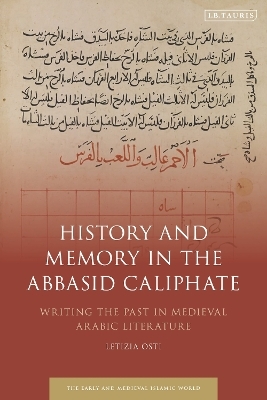
History and Memory in the Abbasid Caliphate
Writing the Past in Medieval Arabic Literature
Seiten
2024
I.B. Tauris (Verlag)
978-0-7556-4781-1 (ISBN)
I.B. Tauris (Verlag)
978-0-7556-4781-1 (ISBN)
- Noch nicht erschienen (ca. Dezember 2024)
- Versandkostenfrei innerhalb Deutschlands
- Auch auf Rechnung
- Verfügbarkeit in der Filiale vor Ort prüfen
- Artikel merken
the first full-length English-language study of Abbasid era polymath Abu Bakr al-Suli
Abu Bakr al-Suli was an Abbasid polymath and table companion, as well as a legendary chess player. He was perhaps best known for his work on poetry and chancery, which would have a long-lasting influence on Arabic literature. His decades of service at the court of at least three caliphs give him a unique perspective as an historian of his own time, although he is often valued as an observer rather than an interpreter of events for posterity.
Letizia Osti here provides the first full-length English-language study devoted to al-Suli, illustrating how investigating the life, times and works of such a complex individual can serve as a fil rouge for tackling broader, contested concepts, such as biography, autobiography, court culture, and written culture. The result is an exploration of the ways in which the Abbasid court made sense of the past and, in general, of what ‘historiography’ means in a medieval Arabic context.
Abu Bakr al-Suli was an Abbasid polymath and table companion, as well as a legendary chess player. He was perhaps best known for his work on poetry and chancery, which would have a long-lasting influence on Arabic literature. His decades of service at the court of at least three caliphs give him a unique perspective as an historian of his own time, although he is often valued as an observer rather than an interpreter of events for posterity.
Letizia Osti here provides the first full-length English-language study devoted to al-Suli, illustrating how investigating the life, times and works of such a complex individual can serve as a fil rouge for tackling broader, contested concepts, such as biography, autobiography, court culture, and written culture. The result is an exploration of the ways in which the Abbasid court made sense of the past and, in general, of what ‘historiography’ means in a medieval Arabic context.
Letizia Osti is Associate Professor of Arabic Literature and Language at the University of Milan, Italy. She has been published in journals such as the Journal of Abbasid Studies, the Journal of Arabic and Islamic Studies and Middle Eastern Literatures is the co-author of Crisis and Continuity at the Abbasid Court (2013).
Acknowledgements
Transliteration and Translation
Introduction
1. Life and Afterlife
2. In his own Words
3. In his own Time
4. In his own Books
5. Insight and Hindsight
Conclusion
Notes
Bibliography
Index
| Erscheinungsdatum | 29.03.2024 |
|---|---|
| Reihe/Serie | Early and Medieval Islamic World |
| Sprache | englisch |
| Maße | 156 x 234 mm |
| Themenwelt | Geschichte ► Allgemeine Geschichte ► Mittelalter |
| Geisteswissenschaften ► Geschichte ► Regional- / Ländergeschichte | |
| Sozialwissenschaften ► Soziologie ► Spezielle Soziologien | |
| ISBN-10 | 0-7556-4781-5 / 0755647815 |
| ISBN-13 | 978-0-7556-4781-1 / 9780755647811 |
| Zustand | Neuware |
| Haben Sie eine Frage zum Produkt? |
Mehr entdecken
aus dem Bereich
aus dem Bereich
eine neue Geschichte des Mittelalters
Buch | Hardcover (2023)
C.H.Beck (Verlag)
38,00 €


